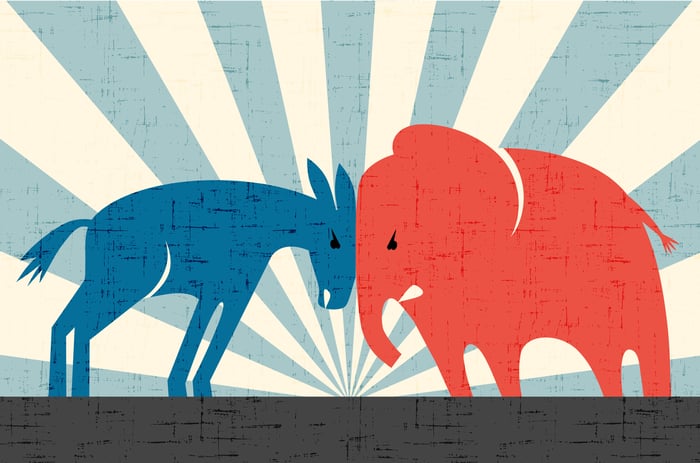Though debatable, Social Security often is referred to as America's most important social program -- and with good reason. Each and every month, nearly 43 million retired workers receive a guaranteed benefit check from the program. Out of these almost 43 million retired workers, some 15.1 million are kept above the federal poverty level as a result of their Social Security payouts, according to an analysis conducted by the Center on Budget and Policy Priorities.
Seniors' reliance on Social Security is creeping higher
As amazing as Social Security has been for retirees, it was never designed to be leaned on so heavily during retirement. In fact, the Social Security Administration suggests that workers expect the program to replace about 40% of their wage income during retirement. Mind you, this percentage could be a bit higher for workers with lower lifetime incomes and lower for those with higher incomes.

Image source: Getty Images.
Recently, national pollster Gallup released the findings of its annual Social Security survey of retired workers that examines their reliance on the program. Since April 2002 and in each successive year, Gallup has asked retirees one question: "How much do you rely on Social Security today -- is it a major source of income, a minor source of income or not a source at all?"
As of April 2018, 57% of retired workers noted that Social Security acts as a "major source" of income, with another 33% pointing to it as a "minor source" of income. Comparatively, just 10% considered it to be "not a source" of income.
Though the 57% of seniors leaning heavily on Social Security isn't an all-time high -- that occurred in April 2013, when 61% cited Social Security as a major source of income -- the combined 90% of seniors who, in some capacity, are reliant on their Social Security income to make ends meet does tie a 16-year high. The only other time 90% of retired respondents in some way have been reliant on Social Security income was the April 2015 poll, where 59% claimed it to be a major source and 31% said it was a minor source. In all previous Gallup polls, between 80% and 89% of respondents have relied on the program as a major or minor source.

Image source: Getty Images.
Why overreliance on Social Security is so worrisome
Given that Social Security is a guaranteed payout for those who've earned the right to receive a benefit during retirement, you might be wondering why leaning too heavily on the program is even a problem. To answer that, we need to turn to the Social Security Board of Trustees' 2017 report.
According to the Trustees report, a major change is set to occur within Social Security in 2022. For the first time in four decades, the program is expected to pay out more in benefits than it generates in revenue. Beginning in 2022 and in each successive year that passes, the cash outflow from the program is only expected to grow. By 2034, the roughly $3 trillion that Social Security had built up from being a cash-flow-positive program since 1983 is expected to be completely exhausted.
The silver lining here for seniors is that an exhaustion of Social Security's excess cash isn't the end of the world -- or the program. It's merely proof that the current payout schedule isn't sustainable. The bad news is that, in order to extend Social Security payouts to a growing number of beneficiaries through 2091, an across-the-board cut in benefits of up to 23% may be needed.
If 57% of today's seniors are relying on Social Security as a major source of income, a 23% haircut is certainly going to be felt. Even for those folks who lean on Social Security to a minor degree, a 23% reduction in payout may not be negligible.

Image source: Getty Images.
Making matters worse, lawmakers on Capitol Hill have thwarted any chance to fix Social Security's issues. Democrats and Republicans each have a core solution that would resolve Social Security's long-term cash shortfall. However, since each of their proposals work, neither side has been willing to back down and negotiate with the other party. The result? More political gridlock.
And the real kicker is that, according to the Trustees' report, the longer Congress waits to act, the more painful it'll be to resolve Social Security's long-term (75 year) cash shortfall. In other words, as reliance on Social Security gradually increases, so does the possibility of a major issue, such as a sudden rise in elderly poverty rates, if benefits are cut by up to 23% in 16 years' time.
Let this serve as a lesson for today's working-age Americans to budget wisely, save what they can, invest for the future, and ensure that Social Security remains, at most, a minor source of income during retirement.




